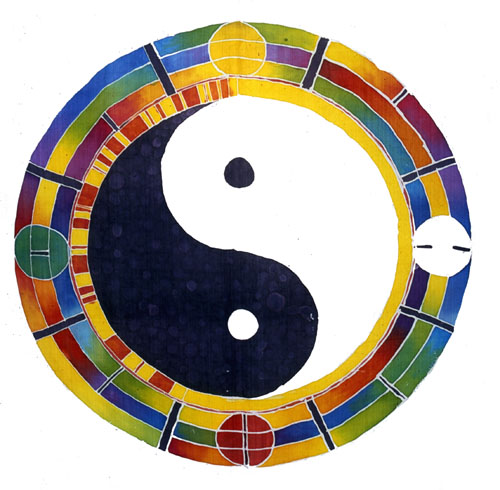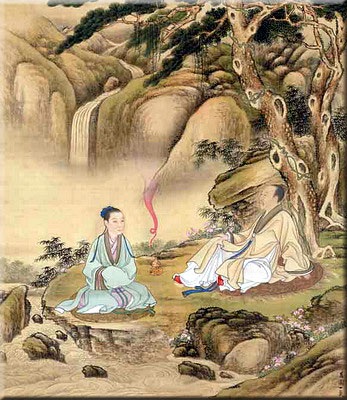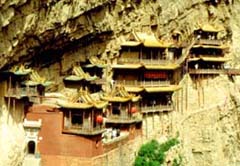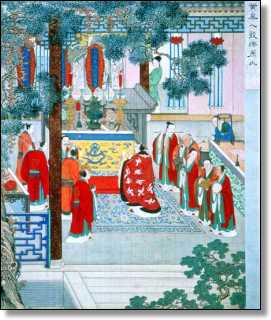 What does Daoism (Taoism) teach us about ecology?
What does Daoism (Taoism) teach us about ecology?
Four main principles of Daoism guide the relationship between humanity and nature:
1. Follow the Earth
The Dao De Jing says: 'Humanity follows the Earth, the Earth follows Heaven, Heaven follows the Dao, and the Dao follows what is natural.' Daoists therefore obey the Earth. The Earth respects Heaven, Heaven abides by the Dao, and the Dao follows the natural course of everything. Humans should help everything grow according to its own way. We should cultivate the way of no-action and let nature be itself.
2. Harmony with nature
 In Daoism, everything is composed of two opposite forces known as Yin and Yang. The two forces are in constant struggle within everything. When they reach harmony, the energy of life is created. Someone who understands this point will not exploit nature, but will treat it well and learn from it. It is obvious that in the long run, the excessive use of nature will bring about disaster, even the extinction of humanity.
In Daoism, everything is composed of two opposite forces known as Yin and Yang. The two forces are in constant struggle within everything. When they reach harmony, the energy of life is created. Someone who understands this point will not exploit nature, but will treat it well and learn from it. It is obvious that in the long run, the excessive use of nature will bring about disaster, even the extinction of humanity.
3. Too much success
If the pursuit of development runs counter to the harmony and balance of nature, even if it is of great immediate interest and profit, people should restrain themselves from it. Insatiable human desire will lead to the over-exploitation of natural resources. To be too successful is to be on the path to defeat.
4. Affluence in bio-diversity
Daoism has a unique sense of value in that it judges affluence by the number of different species. If all things in the universe grow well, then a society is a community of affluence. If not, this kingdom is on the decline. This view encourages both government and people to take good care of nature. This thought is a special contribution by Daoism to the conservation of nature.
 Daoism origins
Daoism origins
Ancient roots
Daoism can be traced back to Shamanism, which spread into Mongolia and China at least ten thousand years ago. Two mythological figures from those early days are the divine brother and sister Fu Hsi and Nu Kua. Together they created human progeny and created all aspects of civilization, such as writing, agriculture, medicine and astrology. They were the first two of the Three August Ones of Chinese mythology. Later came the Yellow Emperor, bringer of order and the first recorded ruler. Legend puts his rule around 2500 BC. He is revered as the one who introduced divine knowledge into human society, especially the arts of medicine.
Formal beginnings
The influence of the Shamans in ancient China waned from the beginning of the first millennium BCE. During this period the great Lao Zi is supposed to have lived, and written the Dao De Jing (Tao Te-Ching), the most important book of Daoist wisdom. Daoism was formally established as a religion under the East Han dynasty, about 2,000 years ago. Since then Daoism has been one of the main components of Chinese culture, and has exerted great influence on the Chinese way of thinking, working and acting.
The five religions of China
Daoism is one of the five recognised religions of China – the other four are Buddhism, Christianity, Confucianism and Islam. Now the influence of Daoism has spread beyond the Chinese-speaking world to attract international interest.
What do Daoists believe?
 Dao: the way
Dao: the way
The heart of the very earliest Chinese vision of the cosmos is the Dao, the origin of all. Dao means ‘the way’. The Dao is the origin of everything and the ultimate aim of all Daoists. The Dao is Heaven, Earth and Humanity. The Dao cannot be defined because it exists beyond all forms. In the words of the great Daoist sage, Lao Zi: ‘That which can be named is not the true Dao’. The Dao teaches wu-wei, the way of no-action and no-selfishness. This means to live in a plain and modest way and not to struggle for material gain.
The value of life
Daoism regards life as the most valuable thing and pursues immortality. Life can be prolonged through meditation and exercise. People should train their will, discard selfishness, and seek to be a model of virtue. With high moral sense and good exercise, one can maintain energy throughout one’s life. To achieve this, Daoism stresses the need for a peaceful and harmonious environment as a very important external condition.
Yin and Yang
The process by which the Dao gave rise to reality is defined in the classic text, Dao-De Jing, as follows:
‘The Tao gives birth to the One.
The One gives birth to the Two.
The Two gives birth to the Three.
The Three give birth to the Ten Thousand.’
These words describe how the Tao, the essence of all, gives birth to Nature—the One—which in turn gives birth to Yin and Yang—the Two. Yin is female, moist, cold, the moon, autumn and winter, shadows and waters. Yang is male, dry, hot, the sun, spring and summer, brightness and earth. From the perpetual striving of Yin and Yang arises the Three—Heaven, Earth and Humanity. Humanity must try to balance the opposites of Heaven and Earth.
Daoist stories and quotes
On Materialism
The Great Way is easy,
but people are forever being taken down sidetracks
They look after the palaces,
but ignore the fields!
The granaries are empty
but they wear wonderful clothes!
From the Tao Te Ching trans. Martin Palmer, Jay Ramsay and Kwok Man-ho. Chapter 53.
"The true man of old did not fight against poverty nor did he look for fulfilment through riches – for he had no grand plans. Therefore he never regretted any failure , nor exulted in success."
from The Book of Chuang Tzu, Trans Martin Palmer, Penguin Classics, P48.
The five colours blind the eye
The five notes deafen the ear
The five tastes deaden the mouth.
Riding the chase on horseback over the fields
drives you crazy when you overdo it;
And wanting what’s precious
you do what distorts your being.
The sage knows this in his gut,
And is guided by his instinct
and not by what his eyes want.
From the Tao Te Ching Chapter 12.
On the judicious use of natural resources
"Nan Po Tzu Chi, wandering amongst the mountains of Shang, came upon a great and unusual tree, under which could shelter a thousand chariots, and they would all be covered. Tzu Chi said: “What kind of tree is this? It is surely a most wondrous piece of timber!” However, when he looked up, he could see that the smaller branches were so twisted and gnarled that they could not be made into rafters and beams; and looking down at the trunk he saw it was warped and distorted and would not make good coffins. He licked one of its leaves and his mouth felt scraped and sore. “This tree is certainly good for nothing,” said Tzu Chi. “This is why it has grown so large. Ah ha! This is the sort of uselessness that sages live by.”
From The Book of Chuang Tsu p34.
A wealthy man held a great feast. After the duck, fish and pig had been served he stood up and said, ‘How kind Heaven is to humanity for it provides us with the fish, birds and beasts to enjoy and use’. But a little boy who was a guest surprised them all by saying “No you are wrong. Of course we take things and eat them but this is not why they were created in the first place. After all, mosquitoes, gnats and tigers bite our skin – does this mean that Heaven originally created us to be food for the mosquitoes, gnats and tigers?”
From a story by the 4th century Chinese writer Lieh Tzu.
On the nature of things
Heaven and Earth are not like humans.
The Tao does not act like a human.
They don’t expect to be thanked for making life,
So they view it without expectation.
Heaven and earth are like a pair of bellows:
They are empty, and yet they can never be exhausted.
Work them and they produce more and more
- there’s too much talking,
it’s really better to stay quiet.
There are too many laws,
when all you have to do is to hold on to the centre
From the Tao Te Ching, op cit. Chapter 5.
On Water
Why is the sea the king of a hundred tributaries?
Because everything comes down to it -
So it is kingly
By this name.
From the Tao Te Ching op cit. Chapter 66.








